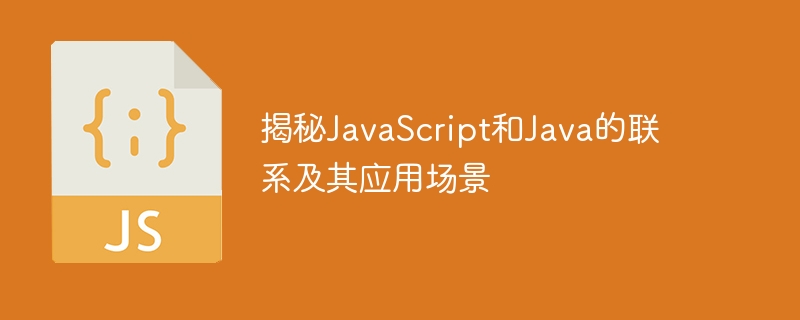Home >Web Front-end >JS Tutorial >Revealing the connection between JavaScript and Java and its application scenarios
Revealing the connection between JavaScript and Java and its application scenarios
- WBOYWBOYWBOYWBOYWBOYWBOYWBOYWBOYWBOYWBOYWBOYWBOYWBOriginal
- 2024-04-03 15:12:021060browse
Although JavaScript and Java have syntax similarities, they are fundamentally different. JavaScript is interpreted in the browser, while Java is interpreted in the JVM. Application scenarios include: JavaScript front-end development, server-side development, game development and automation; Java enterprise applications, mobile applications, desktop applications and big data analysis.

Revealing the relationship between JavaScript and Java and its application scenarios
JavaScript and Java are two completely different things Different programming languages, but they share surprising similarities that can often lead to confusion. In this article, we will explore the connection between these two languages and highlight their application scenarios.
Syntax Similarities
JavaScript and Java share many syntax similarities, including:
- Keywords (such as
if,for,while) - data type (such as
string,number,boolean) - Operators (such as
*,==) - Concepts of objects and classes
These similarities make it easier for people who are familiar with one language to learn the other.
Different interpreters
Despite similar syntax, a key difference between JavaScript and Java is their interpreters. JavaScript is interpreted in the browser, while Java is interpreted in the Java Virtual Machine (JVM). This means that JavaScript code can run on any device with a browser, while Java code requires a specific JVM to be installed.
Application scenarios
JavaScript application scenarios
- Front-end development: JavaScript is widely used to create interactive web pages and mobile apps.
- Server-Side Development: JavaScript frameworks such as Node.js allow running JavaScript code on the server side.
- Game Development: JavaScript is widely used and can be used to develop 2D and 3D games.
- Automation: JavaScript can be used to automate tasks such as form validation and data wrangling.
Java application scenarios
- Enterprise-level applications: Java is widely used to develop large-scale enterprise-level applications, such as banking systems and e-commerce platforms .
- Mobile Applications: Android applications are developed using Java.
- Desktop Applications: Java can be used to build cross-platform desktop applications.
- Big Data Analysis: Java frameworks such as Hadoop and Spark are used to process big data.
Practical case
JavaScript front-end development:
const form = document.getElementById('form');
form.addEventListener('submit', (event) => {
event.preventDefault();
const name = event.target.querySelector('input[name="name"]');
const email = event.target.querySelector('input[name="email"]');
alert(`Name: ${name.value}, Email: ${email.value}`);
});Java enterprise application:
import javax.persistence.*;
@Entity
@Table(name = "customer")
public class Customer {
@Id
@GeneratedValue(strategy = GenerationType.IDENTITY)
private Long id;
@Column(name = "name")
private String name;
@Column(name = "email")
private String email;
...
}The above is the detailed content of Revealing the connection between JavaScript and Java and its application scenarios. For more information, please follow other related articles on the PHP Chinese website!

